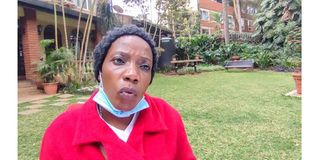Scars of poll chaos: Sexual violence survivors’ wish list

Ms Hellen Were at a Nairobi hotel on July 1, 2022. She is an election-related sexual violence survivor.
What you need to know:
- During a Nairobi forum held last Friday for survivors of election-related sexual violence, one of them asked the government to be publishing the names of security officers deployed in their areas.
- This, she said, would be a way of holding them accountable should there be cases of sexual violence in their areas of jurisdiction.
Hellen Were has a scar from the post-election chaos of 2007/08.
Ms Were, a person living with disability, says she was raped at Kibra, Nairobi County. At the time, she was eight months pregnant.
“What happened was like a black day for me,” she says. “And because of the rape, I am now HIV positive.”
The rapist had hit her with a blunt object on the head. She fell, only to come round hours later in a hospital in Kibra. She was shaken and would not tell that she had been raped until three days later.
“There was so much tension then. Even the doctors were confused and overwhelmed by the number of casualties delivered. I remember the doctor asking me: ‘Do you feel okay now?’ I said yes and he released me,” she says.
“While at home, I felt pain in my lower abdomen when I coughed. I suspected I had been raped but I brushed off the thoughts because it was too scary even to imagine such.”
But the pain persisted, followed by labour pains. On the third day, her mother rushed her to a nearby hospital where a doctor discovered that she had been raped. That the rapist had affected the baby. To survive, it had to be born immediately.
She was hit with another disastrous news. The tests had revealed that she had been infected with HIV.
“If only the doctor at Kibra hospital was well trained in how to handle women casualties during violence, I would not be HIV-positive. He would have administered me with Prep (Pre-exposure prophylaxis,” she says.
PrEP is a medicine given to survivors of sexual violence to prevent them from getting HIV.
“Up to now, it hurts me so much that I’m HIV-positive because of a stranger; because of election,” she says.
Worst still, she lost her son nearly a month later because of breathing complications.
“When it comes to sexual violence during chaos, even the persons with disabilities are not spared. Just I imagine I have a physical disability and I can see and they did this to me. What about the one who is blind? I know one who was raped,” she says.
“The act of rape even destroys a marriage. Your husband is okay. Nothing happened to him. He doesn’t understand your pain. He considers you a prostitute. He doesn’t want to associate with you and so he walks away. That’s exactly what happened to me. He left me.”
Her wish is that there will be no chaos during or after the August 9 General Election. But should there be, her appeal to the government and other development partners is to ensure all the women and girls rescued are thoroughly examined and medicated.
In preparation, she calls for the establishment of well-equipped community-based clinics where the attacked can receive immediate and comprehensive healthcare.
For the security officers, she recommends pre-counselling to manage their tensions so that they don’t transfer them to the women and girls in the form of sexual abuse.
More than 3,000 women suffered sexual violence in 2007/08 post-poll chaos, according to the Coalition on Violence against Women. Many of them were from Nairobi slums, Nyanza, Rift Valley and Coast regions where chaos was worse.
Police officers and members of organised gangs were identified as perpetrators of sexual violence, by the Commission of Inquiry into the 2007/08 post-election violence.
This is alongside neighbours, relatives, supposed friends, and individuals working in camps set aside for the internally displaced persons.
During a Nairobi forum held last Friday for survivors of election-related sexual violence, one of them asked the government to be publishing the names of security officers deployed in their areas. This, she said, would be a way of holding them accountable should there be cases of sexual violence in their areas of jurisdiction.
“The government often says there are no suspects. This time, give us the list of all the police you have sent to keep order in Mathare or Kibra. These are the people we will look for when a woman is raped. Then you will not say that there is no suspect,” she said during the forum, which was convened by Physicians for Human Rights





